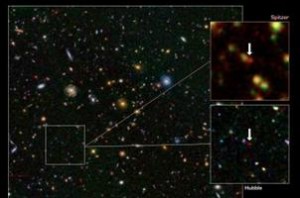 Digital News Report – Astronomers believe they have found one of the earliest galaxies in the universe. The GN-108036 galaxy, which has been verified using the lens of the Subaru Telescope atop Mauna Kea in Hawaii, was originally spotted using space based telescopes.
Digital News Report – Astronomers believe they have found one of the earliest galaxies in the universe. The GN-108036 galaxy, which has been verified using the lens of the Subaru Telescope atop Mauna Kea in Hawaii, was originally spotted using space based telescopes.
The leader of this research, Masami Ouchi of the University of Tokyo, Japan, said the galaxy is approximately 12.9 billion light-years away. Considering that the Universe is around 13.7 billion years old, the researchers are looking back in time to the early millennia of the Universe.
At that time the galaxy was about 5-times smaller than our Milky Way Galaxy but producing 30 times more starts. It is estimated that the Milky Way produces about three stars a year while GN-108036 produced around 100 stars per year.
University of California, Riverside astronomer Bahram Mobasher and his graduate student Hooshang Nayyeri say the galaxy was first discovered using the space-based Spitzer and Hubble telescopes. They used the land-based Subaru telescope to confirm their findings.
They say the GN-108036 galaxy is the brightest galaxy they have found in the early universe. Only two other galaxies have been found to be more distant.
“The high rate of star formation found for GN-108036 implies that it was rapidly building up its mass some 750 million years after the Big Bang, when the universe was only about five percent of its present age,” said Mobasher, a professor of physics and astronomy. “This was therefore a likely ancestor of massive and evolved galaxies seen today.”
By: Tina Brown
Science Writer
Image: one of the most distant galaxies known, called GN-108036, dating back to 750 million years after the Big Bang that created our universe. The galaxy’s light took 12.9 billion years to reach us. NASA/JPL-Caltech/STScI/University of Tokyo
